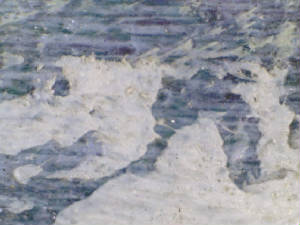|
MARY BUSTIN CONSERVATION |
|
|
Technical Art History
Technical examination of a painting reveals how an artist used their paints to create particular effects. At
high magnification, and using a variety of diagnostic techniques, we explore how materials are combined or layered, or pushed
to the boundaries of their properties to create these effects. This is a key tool that we use to explore problems
and to identify the subliminal qualities that make a painting 'work'. This deeper knowledge of the properties of the
painting feeds in to the design of its conservation treatment. Using
technical art history We offer technical studies of paintings for other uses: for example to support curatorial
research for exhibitions and cataloguing, and for interpretation education resources. Studies can be tailored to meet your
research questions or exhibition themes. Please contact us to discuss how we might help. Examples of past contributions may
be found on the projects page. We supply a detailed description of the structure of the painting, identify materials, explore how the paint was
applied and handled and include digital images of significant features characteristic to the artist at work. We do not offer
authentication of paintings. Scientific analysis is outsourced to conservation scientists across the UK and Europe
according to the questions and analytical methods required (indicated below *). We carry out, commission, collate, and
interpret data from a range of options including: |
|
|
